
Note Oil Palms in Front of Trees,
to Left of Road, and on Far Right
We left the Sepilok Forest Reserve and drove through more depressing, monotonous oil palm plantations, headed for the Kinabatangan River.
 |
| Remnant Forest Ridge
Note Oil Palms in Front of Trees, to Left of Road, and on Far Right |
We didn't quite make it. There was a bridge we had to cross, and it was out. It was not unexpected, however, and as C.K. parked the van and we got our stuff out we were met by a couple of guys from the Myne Resort, where we would be staying.
 |
 |
| Kinabatangan Bridge Out | Kinabatangan Bridge Out |
Just before we got to Myne Resort, we passed a big concrete building with no windows except a small square opening way up high. It looked like a maximum security prison of sorts, but C.K. informed us it was a commercial factory where they raised swallows and swifts so they could harvest the nests to sell for use in birds' nest soup.
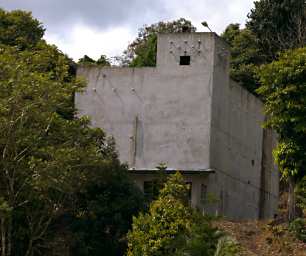 |
| Bird Nest Soup Factory |
We were welcomed at Myne Lodge with a great fruit drink, which I'll admit was hard not to guzzle. I'm a guzzler by nature, and can down a mug of water in about two gulps when I'm hot and thirsty. We settled in to our new digs and then since it was already afternoon, we headed out to explore the river. Our boat was a great platform for wildlife observation. Ram manned the bow gun, and Dawn and I balanced out on the sides.
One of the big benefits of using C.K. as a bird guide is that we got our own boat. C.K. figures his job is to help us find birds, and he knows that you don't see as much when you try to do birding in a boat full of regular tourists. So all of our activities with C.K. were with just us, or in this case, us plus the boatman.
 |
 |
| Ram Cooling Off | Ram and Dawn |
The river did not disappoint us; there were a lot of different hornbills, raptors, egrets, kingfishers, and broadbills.
 |
 |
| Oriental Darter | Oriental Darter |
 |
 |
 |
| Great Egret | Great Egret | Great Egret |
 |
| Crested Serpent Eagle |
 |
| Oriental Pied Hornbill |
 |
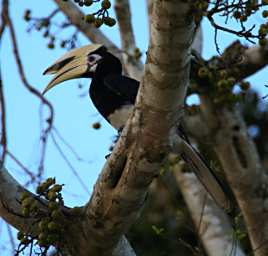 |
| Oriental Pied Hornbill | Oriental Pied Hornbill |
We were hoping to see some primates. While seeing the Orangutans at Sepilok was fun, it was a bit like being in a zoo. We were hoping for a glimpse of one along the river. Towards evening, we came upon a tree full of Proboscis Monkeys. They are found only in Borneo, and boy, are they ... appropriately named!
 |
| Proboscis Monkeys |
 |
 |
 |
| Proboscis Monkey | Proboscis Monkey | Proboscis Monkeys |
 |
 |
| Proboscis Monkeys | Proboscis Monkey with Child |
The hornbills were everywhere, and many were not too shy and allowed us to observe them for a fair amount of time. We also found an occasional woodpecker, but they were not nearly so obliging. Usually all we got of them was a glimpse, and they would either fly off or disappear around the back side of their tree. The kingfishers were similar, flying off as soon as we got close enough to see much of them, although occasionally one would linger a bit longer.
 |
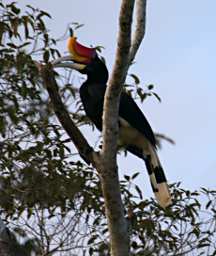 |
| Rhinoceros Hornbill | Rhinoceros Hornbill |
 |
 |
 |
| Stork Billed Kingfisher | Stork Billed Kingfisher | White Bellied Woodpecker |
We stayed out until sunset, and usually saw a tree full of primates of one sort or another on the way back.
 |
 |
| Kinabatangan Sunset | Sunset, Long Tailed Macaques |
There are a bunch of Bearded Pigs around, and the resort throws out a bunch of kitchen scraps in the evening to draw them in for their customers. I guess it's the Borneo equivalent of feeding the deer. The resort folks didn't seem to be too concerned about them. We were more careful, always aware of the fact that wild animals can be unpredictable.
 |
 |
| Myne Resort | Bearded Pig |
 |
| Xxx Hawk |
Our second day we had a great time -- a big orangutan was hanging out in a tree on the bank, munching some kind of fruit for lunch. Occasionally we would see an orangutan nest, but we never saw an orangutan actually resting in one. They look pretty flimsy, but if you're only staying for one day the way the orangutans do, you don't want to put too much time into building it.
 |
 |
| Orangutan | Orangutan Nest |
We found quite a few groups of long tailed macaques, and they seemed pretty used to tourists like us. They pretty much just hung out, and we could ease the boat up to within a few meters of them.
 |
 |
 |
| Long Tailed Macaques | Long Tailed Macaque with Child | Long Tailed Macaque |
 |
 |
 |
| Long Tailed Macaque | Long Tailed Macaque | Long Tailed Macaque |
 |
 |
| Great Egret | Storms Stork |
There are oil palm plantations all along the river, and they have left only about 50 m of jungle by the river. Apparently the orangutans don't like to get wet, so where a tributary comes in, it blocks the orangutan from moving further down (or up) the river. To get around this problem and allow the orangutans to move around more widely, conservationists have built rope crossings.
 |
| Primate Crossing |
 |
 |
 |
| Xxx | Xxx Sunbird | Xxx Sunbird |
There was a big praying mantis on one of the shrubs at the resort; s/he was pretty cool.
 |
 |
| Praying Mantis | Praying Mantis |
 |
| Ram Shooting Praying Mantis |
We didn't see many butterflies, which was a disappointment.
 |
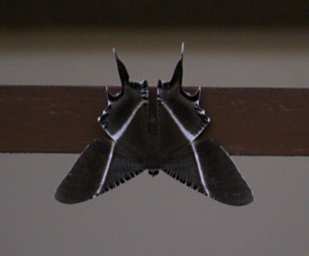 |
| Butterfly Xxx | Butterfly Xxx |
Before I left for Borneo, Tom Martin had sent me a picture he had taken of Pygmy Elephants along the river. There are only a few of them left in Borneo, mostly because of habitat destruction. We were all hoping to see some, but when we arrived at the lodge the word was they were not back yet. They migrate from one place to another, depending on the time of year. They were expected "real soon now." On our second afternoon C.K. gathered us up to go out again; he had gotten word from some Brits staying at the lodge that the elephants were back, and they had seen them that morning. Most of the boats on the river were heading downstream, but this time we went up.
 |
| Village Mosque |
... And there they were! We found them in amongst someone's weekend retreat, generally raising havoc, eating the leaves off the roof and taking things apart to see what might be in them. I've never seen a full-grown African or Indian elephant in the wild, and I haven't seen one in a zoo for ages, but I know they're big. These Pygmy Elephants were ... well, pygmy. About two meters tall, which is still a big animal, but not a giant. And I certainly wouldn't want one to charge me or put its foot down on mine.
 |
 |
| Pygmy Elephants |
 |
 |
| Pygmy Elephant Youngster | Pygmy Elephant with Radio Collar |
 |
 |
| Pygmy Elephants | Pygmy Elephants |
 |
| Pygmy Elephants |
 |
| Pygmy Elephant in River Muck |
When we headed home we came across some bee-eaters feasting on some big moths. It was pretty dark and we could barely see them. Sometimes we could look up in the sky over the river and spot a moth, and about the time we did we would see one of the bee-eaters take off and nail it. The moths looked almost too big for them to eat, but they managed.
 |
 |
 |
| Blue Throated Bee Eater | Blue Throated Bee Eater | Blue Throated Bee Eater
with Moth |
 |
| Sunset |
C.K. took us out for a night trip on the river, spotlighting the bank to see what we could find. We slid right up to a kingfisher which I guess was asleep. I could have reached out and grabbed it, but I didn't. We found a couple of owls, a bittern, and the elephants. But in general I was disappointed; I had hoped to find more. I think I must always have unreasonable expectations of these night trips, as I never see as much as I think we should.
The next day we went down to one of the tributaries, the Menuggal, and worked our way up it a little ways. It runs through a sanctuary so there is more jungle on both sides of it than the main river.
 |
 |
| Tributary | Tributary |
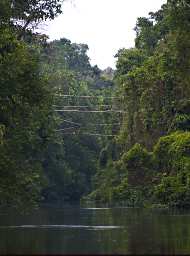 |
 |
| Primate Crossing | Primate and Human Researcher Crossing |
On the way down we saw a female Orangutan with a baby, and another one in a different place.
 |
| Orangutan Mom with Kid |
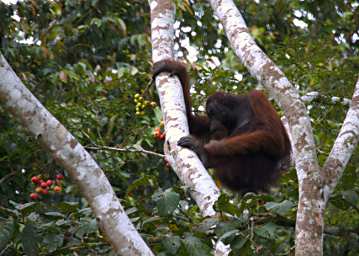 |
 |
 |
| Orangutan | Orangutan | Orangutan |
On the way back we found a big male orangutan hanging out in a tree, munching on some kind of round fruit. He was happy to just hang out while we watched and took pictures.
 |
 |
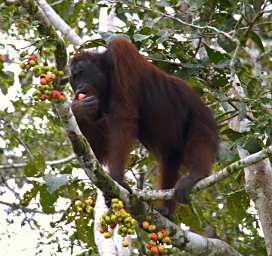 |
| Orangutan | Orangutan | Orangutan |
 |
 |
 |
| Black And Red Broadbill | Black And Red Broadbill | Black And Red Broadbill |
 |
 |
| Xxx Nest | Xxx Gecko |
It is a real travesty that more of the riparian corridor has not been preserved. Almost everywhere we went, you could look through the jungle trees along the bank and see oil palms behind them. In places, they came right down to the river, and there was not riparian habitat left at all. It struct me as a place badly in need of a Nature Conservancy big scale conservation effort like some of the things they have done in Montana. If you could preserve a kilometer on each side of the river and its major tributaries, it would have a huge beneficial effect. So I asked C.K. about the economics of Oil Palms, to try to get a handle on what it would cost. He told me oil palms bring in about $10,000 per acre per year. They don't yield anything for the first three years, but after that they are a money-tree of the first order until they are about 20. I did a quick check and saw prices for 20,000+ acres advertised from $7,000 to $10,000, so the price C.K. stated are in the ballpark. Ugh! At those prices, purchasing land to conserve it is out of the question. If you could get enough of it and get the price down to about a tenth of that, it might be workable. Don't buy anything with palm oil in it!
 |
| Oil Palm |
 |
 |
| Oil Palm | Oil Palm |
On our last evening at Myne on the Kinabatangan, C.K. took us for a long drive to the Gomantong Caves, where they gather birds nests for birds' nest soup.
 |
 |
| Myne Resort | Myne Resort |
The next morning the river was shrouded in mist. After our usual great breakfast, we headed out for the last place we would visit with C.K., the Tabin Wildlife Reserve.
 |
 |
| Morning Mist | Morning Mist |
 |
 |
| Morning Mist | Foggy Morning |